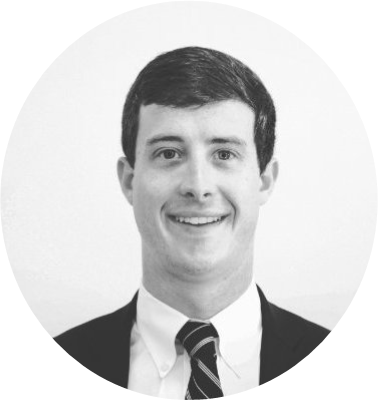Deacon Spotlight: Noland Griffith
Noland Griffith (’15, BA Communication)
Financial Services Consultant at Ernst & Young in Charlotte, NC
Tell us about your current role and what you’re currently working on.

I am currently a second year analyst at Ernst & Young, working on the living will campaign for a large cap U.S. bank. I am on a team of 10 consultants who are charged with drafting a will (similar to an estate plan) for this bank to submit to the Federal Reserve & FDIC.
What personal and/or career experiences did you have prior to landing your current job and leading to where you are now?
Honestly, my breakthrough to this field can be credited to Jim Dunn, who at the time was the CIO of Wake Forest, but is now the CEO of Verger Capital Management. His office offered four internships each semester, and I was fortunate enough to land their only non-business school internship for the fall of my junior year. Because of my performance during this internship, Jim felt comfortable vouching for me to employers in New York. My time in the Office of Investments laid the ground work to secure three additional financial internships. My experiences both in the Office of Investments and these other internships helped me to successfully interview at Ernst & Young.
What was the most challenging aspect of your first “real world job” and what did you learn from it?
The biggest challenge has been adjusting to a different measure of success post-graduation. For much of your formative years, you are trained to believe that grades are the ultimate measure of success. Whereas, in the real world, measures of success are related to metrics like having strong soft skills, your ability to communicate effectively, your ability to produce high-quality work products by deadline, your value-add, etc. I’ve learned that preparation is key – whether it is preparing for a presentation or speech you are about to give, or internalizing certain facts about a colleague or client that will allow you to have a more valuable conversation down the road, preparation shows not only that you know what you’re talking about, but that you care.
What advice would you give to new Wake Forest graduates about developing their personal life habits after college?
In many jobs, it is difficult to truly have a work life balance during the normal Monday – Friday work week; but I’ve seen most recent graduates fail to maintain their personal life habits especially on the weekends. When you first enter the real world, a pay check can indirectly seem like a source of freedom to burn the midnight oil with friends. But this will, in turn, cause you to let other important life habits, like exercise, spending genuine moments with friends, expanding relationships in your apartment complex and work, fall by the wayside. Keep it in perspective, don’t forget to take care of yourself and your personal needs (aka. having a little me time) on the weekends to re-charge for a strong work week.
How have you made personal and professional relationships in your city, company, or community?
Fortunately for me, I was born and raised in Charlotte, North Carolina, where I currently live. The biggest way I’ve expanded my community is by not being afraid to reach out to those that may have been acquaintances in college or before college. The real world can be, no excuse me, IS intimidating; why not start with someone who is familiar with you? Throw your inhibitions out the window and be that friendly face. By re-establishing this familiar connection, you will be able to establish other connections, and your personal and professional network will continue to grow.
Have you been mentored by anyone at Wake Forest or in your professional life? If so, what impact has that relationship had on you?
Most of the mentoring I have received came from those at Ernst & Young. I am fortunate enough to be at a company where they provide you with a peer advisor and counselor to ask any questions you may have, on or off-the-record. Also, the Charlotte office of EY has a strong base of young professionals that I have been able to benchmark off of, to learn from their successes and failures, to attempt to minimize failure and maximize success myself. The positive impact many of these colleagues have had on me has allowed me to not only have success at my job thus far, but also truly enjoy it, while so many others in my class, or the classes graduating before me, have already changed jobs and or occupations in their first few years post-graduation.
What advice would you give to current Wake Forest students and/or young alumni who are about to start their first professional job?
Do not come out guns a-blazing in your first job. Show your employers that you cannot only work diligently and efficiently, but you are willing to learn from their wisdom and perspective. It is more important to prove your worth as a strong, hard-working employee, rather than trying to prove your worth as a creative and intelligent mind. Trust me, there will be plenty of opportunities to express your opinions and provide creative notions, but my advice is to maintain a strong air of respect and humility when you begin your professional career.
What are your future career goals or plans? How are you being intentional about working towards them?
My future goal as of now is to complete my three-year rotational program at Ernst & Young, and then who knows from there! I really enjoy EY, and if for some reason I decide consulting is not for me, I may request to move laterally within the company to a recruitment or business development role. As of now, I love where I am.
Story published in May 2017. For current updates about Noland, visit his LinkedIn Page.
